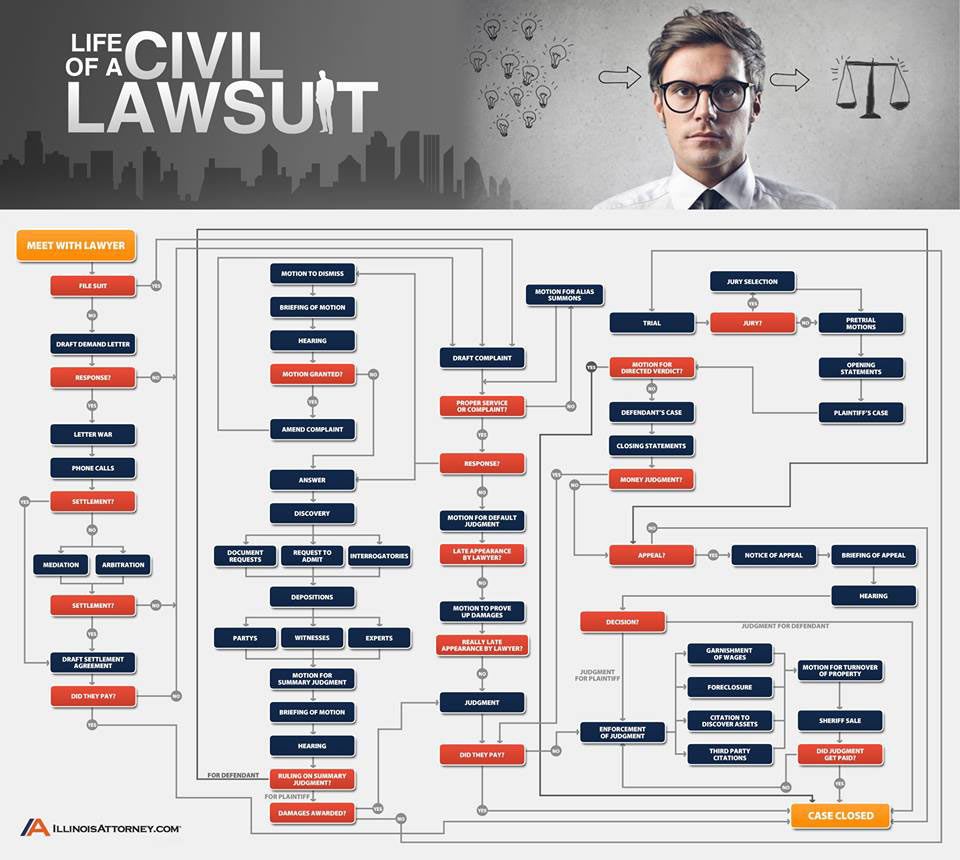Why Does the Litigation Process Take so Long in Illinois (and Everywhere)?
Feb. 14, 2019

Whether you or someone you know is dealing with a lawsuit or criminal charge, you might be wondering why legal cases go on for such a long time. Although each case is unique and therefore will proceed in its own idiosyncratic fashion, there are some common steps in all cases before the final resolution.
First, there are often attempts to negotiate or settle a case before it is even filed. If possible, I would always recommend this. This is not only cost-efficient for all involved, but it saves the parties time and emotional investment into the litigation. If settlement does not happen at the onset, it can always happen after litigation is initiated.
Certain cases require that administrative remedies be exhausted before filing the case, such as discrimination cases. In those cases, a charge must be filed with the Illinois Department of Human Rights or the Equal Employment Opportunity Commission. This is a mini lawsuit in and of itself as the agency will undertake an investigation and issue a decision on the merits of the claim. Thereafter, the agency will issue a right to sue notice.
Next, a complaint is prepared and filed. The defendant has to be served with the complaint and the summons. If the case is filed in Cook County, the first attempt at service of process on the defendant must be made by the Cook County Sheriff. The Sheriff has 28 days to serve the Defendant(s). If no service is had, a motion must be made to the court to appoint a special process server and then an alias summons is issued and the 28-day process starts all over. The Plaintiff can utilize the Sheriff again for service of process but may have better luck with a process server or investigator as many only get paid if they are able to serve the Defendant(s).
Once the Defendant is served, they need to respond to the complaint or they will be held in default. They are normally given 28 days to do so, but the court routinely grants them additional time if they ask for it. They may file a motion to dismiss the complaint about procedural or substantive reasons and a briefing schedule will be entered and a hearing date set. If a motion is filed attacking the complaint, the plaintiff will normally get 28 days to respond and the movant will get 14 days to reply thereto. By the time there is a hearing, 4-6 months have gone by from the date of complaint filing and you may still be awaiting a formal answer to the complaint. Yikes!
Once the Defendant files an answer to the complaint, they may assert affirmative defenses or counterclaims. Those will need to be responded to by the Plaintiff. The Plaintiff, like the Defendant, may move to dismiss or strike those defenses and claims. The whole briefing schedule process is repeated. However, once the parties are at issue, they will likely begin discovery.
Fingers crossed your case settles before discovery begins. If there is no possibility of settlement, the discovery stage begins and it prevents any "surprises" at trial. Through discovery, each party asks questions and requests documents to understand the opposing side's arguments and evidence they will introduce at trial. Once written discovery is complete, the parties will undertake oral discovery. Oral discovery or depositions are a question and answer session of parties as well as witnesses the parties intend to call at trial. All and all discovery can take a few months up to a year for very complex cases.
Once discovery is completed, the parties can move for summary disposition. That is when a party asks the court to rule on and dispose of the case. This is known as a motion for summary judgment and will only be granted if there is no issue of material fact and the moving party is entitled to judgment as a matter of law. Once this motion is filed, the party against whom summary judgment is sought will have a chance to respond and the moving party will reply to their response. A hearing date will take place thereafter. If the Judge finds that summary judgment is appropriate, he will grant the motion and no trial will be necessary. If he does find that there is a genuine issue of material fact, the case will go to trial.
Preparing for trial is not for the faint of heart. The good news is that almost all cases settle before trial. If the case does proceed to trial, there will be a pretrial order entered which lists all testifying witnesses, all documents to be used and instructions that will be given to a jury (if a jury is requested by one of the parties). If no jury is requested, the Judge will be the trier of fact and this is referred to as a bench trial. The trial can take a day or weeks, it all just depends on the complexity of the case, the number of witnesses, jury selection, presentment of evidence, etc. After the close of all evidence, the jury or judge will make a ruling on the merits of the case.
..... and then the losing party can appeal, so the case might not be over. That topic is for another day, preferably over a glass of wine. Thankfully, our attorneys try to short circuit this process in favor of our clients through settlement efforts, early attempts at summary disposition and targeted discovery. Our goal is to make this as pain-free as possible for you. Do you have a potential matter that may require litigation?